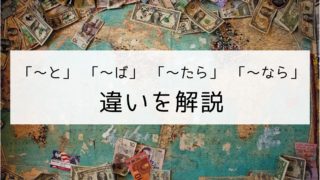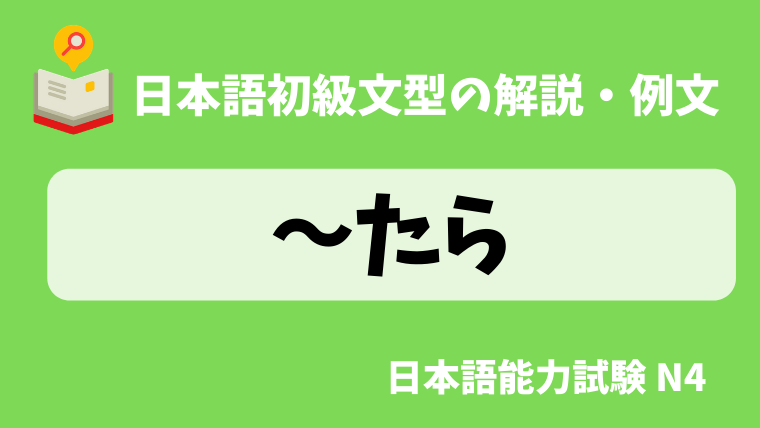目次
解説:〜たら
●意味
条件を表す表現。
前件の条件が成立すると、後件の事柄が起こることを表す。
An expression that represents a condition.
It indicates that if the condition (antecedent) is fulfilled, the consequence (consequent) will occur.
●接続
V(タ形)+ ら / V(ナイ形)ない + かったら
イAかったら / イAくなかったら
ナAだったら / ナAじゃなかったら
Nだったら / Nじゃなかったら
●日本語能力試験(JLPT)のレベル
N4
●備考
① 話し言葉で使う。
Used in spoken language
② 条件は実現性が高いものでも、低いものでも使える。
It can be used for conditions that are highly likely to be fulfilled or less likely.
③ 働きかけの表現や意志を含む表現と一緒に使える。
Can be used together with expressions indicating efforts or intentions.
例文
1. 仮定条件:Hypothetical Conditions
もし宝くじで100万円当たったら、何をしますか?
What would you do if you won 1 million yen in the lottery?
明日、天気がよかったら、出かけます。
If the weather is good tomorrow, I’ll go out.
単語の意味がわからなかったら、辞書で調べてください。
If you don’t understand the meaning of a word, please look it up in the dictionary.
もしトムさんに会ったら、先生が探してたよって言っておいて。
If you see Tom, tell him the teacher was looking for him.
もし早く終わったら、間違いがないか見直しをしてください。
If you finish early, please double-check for any mistakes.
さすがに3万円は高すぎますよ。1万円だったら買います。
30,000 yen is definitely too expensive. I would buy it if it were 10,000 yen.
海外でパスポートをなくしてしまったら、どうしますか。
What would you do if you lost your passport abroad?
2. 確定条件:Definite Conditions
6時になったら、帰ります。
I will leave at 6 o’clock.
晩ご飯を食べたら、お風呂に入って、寝ます。
After dinner, I’ll take a bath and go to bed.
大学を卒業したら、国へ帰って働きます。
After graduating from university, I’ll return to my country and work.
今日は家に帰ったら、国の家族とSkypeで電話する予定です。
When I get home today, I plan to Skype with my family back home.
ジョンさんが来たら、飲み会を始めましょう。
Let’s start the party when John arrives.
今日、授業が終わったら、カラオケにでも行きませんか。
After class today, would you like to go to karaoke or something?
「〜と」「〜ば」「〜たら」「〜なら」の違い




